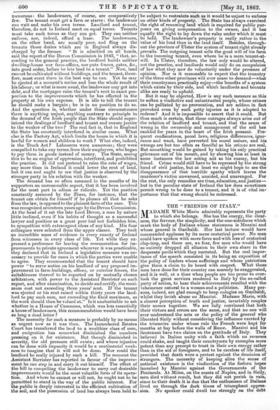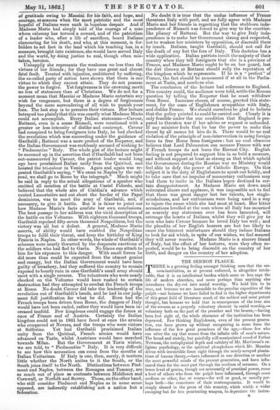THE " FRIENDS OF ITALY."
MADAME White Mario admirably represents the party to which she belongs. She has the energy, the clear- ness, the fervour, the simplicity, and the one-sidedness which mark the body of Italians whose statesman is Mazzini and whose general is Garibaldi. Her last lecture would have commanded applause by its mere oratorical power. No man could have spoken with more force and with less of oratorical clap-trap, and there are, we fear, few men who would have so entirely dropped all allusion to their own share in the desperate perils which they narrated. But the real impor- tance of the speech consisted in its being an exposition of the policy of leaders whose sufferings and whose patriotism give them a claim to be heard with respect. What these men have done for their country can scarcely be exaggerated, and it is well, at a time when people are too prone to over- look the great services rendered to Italy by the so-called party of action, to hear their achievements recalled with the vehemence natural to a woman and a politician. Many per- sons, indeed, are glad enough to heap eulogies on Garibaldi, whilst they lavish abuse on Mazziui. Madame Mario, with a clearer perception of truth and justice, invariably couples their names together. We are fully convinced that both their virtues and errors are the same, and that no one will ever understand the acts or the policy of the general who liberated Sicily without considering the influence exerted by the triumvirs under whose rule the French were kept for months at bay before the walls of Rome. Mazzini and his lieutenant have two claims on the gratitude of Italy. They believed in Italian unity with a faith which no reverses could shake, and taught their countrymen by examples more potent than any precept to trust in their own energy rather than in the aid of foreigners, and to be careless of life itself; provided that death were a protest against the dominion of strangers. The necessity of keeping alive the sense of national existence is the vindication of the forlorn hopes launched by Mazzini against the Governments of the Peninsula. At Milan, on the coasts of Naples, and in Sicily, men died without result, but they did not perish in vain, since to their death it is due that the enthusiasm of Italians lived on through the dark times of triumphant oppres- thon. No speaker could dwell too strongly on the debt of gratitude owing to Mazzini for his faith, and hope, and courage, at seasons when the most patriotic and the most hopeful of Italians were sunk in hopeless despair. And if Madame Mario had simply told of the courage of a man whom calumny has termed a coward, and of the patriotism of a leader who, after a life of sacrifices, heard Italians clamouring for his death, and who, at this moment, is for- bidden to set foot in the land which his teaching has, in a measure, brought into existence, she would have served Italy and the world, by doing justice to real, though often mis- taken, heroism.
Unhappily she represents the weakness no less than the virtues of her friends ; for they have one great and almost fatal fault. Treated with injustice, embittered by suffering, the so-called party of action have shown that there is one virtue to which they cannot attain. They do not possess the power to forgive. Yet forgiveness is the crowning merit no less of statesmen than of Christians. We do not for a moment mean that Mazzini or Madame Mario entertain any wish for vengeance, but there is a degree of forgiveness beyond the mere surrendering of all wish to punish your foes, The last step is to perceive their virtues. Her lecture betrayed too plainly that this was exactly what Madame Mario could not accomplish. Every Italian statesman—Cavour, Rattazzi, even in a sense Ricasoli, were mentioned with a greater or less intensity of dislike and contempt. Cavour had conspired to bring foreigners into Italy, be had checked the revolution which was succeeding under the guidance of Garibaldi ; Rattazzi was a mere prefect of the Emperor, and the Italian Government was recklessly accused of wishing to " Piedmontize " Italy. The whole gist of the lecture might be summed up in the assertion that if Garibaldi had not been out-manoeuvred by Cavour, the patriot leader would long ago have proclaimed Italian unity from the Quirinal, and hoisted the tri-colour in Venice. Again and again was re- peated Garibaldi's saying, " We came to Naples by the rail- road, we shall go to Rome by the telegraph." Much might be said in reply to the actual allegations of a speaker who omitted all mention of the battle at Castel Fidardo, and believed that the whole aim of Cialdini's advance which routed Lamoriciere and cut short the border of the Papal dominions, was to meet the army of Garibaldi, and, if necessary, to give it battle. But it is fairer to point out how Madame Mario's facts confute her own conclusions. The best passage in her address was the vivid description of the battle on the Volturno. With eighteen thousand troops, Garibaldi repulsed fifty-seven thousand Neapolitans, but the victory was all but a defeat. A general, Madame Mario asserts, of ability would have enabled the Neapolitan troops to fulfil their threat, and keep the birthday of King Francis in Naples. In other words, the whole of Garibaldi's schemes were nearly thwarted by the desperate exertions of the soldiers who had fled to Gaeta. No blame can attach to him for his exposure to this danger. With small forces be did more than could be expected from the utmost genius and energy, but the Italian Government would have been guilty of treachery, had they suffered the country to remain exposed to hourly ruin in case Garibaldi's small army should meet with a single reverse. The volunteers who were nearly checked on the Volturno would have rushed to certain destruction bad they attempted to combat the French troops at Rome. No doubt Cavour did take the leadership of the revolution out of Garibaldi's bands, and he had in our judg- ment full justification for what he did. Even had the French troops been driven from Rome, the dangers of Italy would have not been ended, rather they would have been in- creased tenfold. Few kingdoms could engage the forces at once of France and of Austria. Certainly the Italian kingdom could not in 1861 have faced at once the armies who conquered at Novara, and the troops who were victors at Solferino. Yet had Garibaldi proclaimed Italian unity from the Quirinal, French armies would have advanced on Turin, whilst Austrians would have marched towards Milan. But the Government at Turin wishes, we are told, to " Piedmontize " Italy. It is very difficult to see how this accusation can come from the mouths of Italian Unitarians. If Italy is one, then, surely, it matters little whether the North unites to it the South, or the South joins itself to the North. Distinctions between Pied- mont and Naples, between the Romagna and Tuscany, are as much out of place as contrasts between Middlesex and Cornwall, or Norfolk and Surrey. Those, on the other hand, who still consider Piedmont and Naples as in some sense opposed, are indirectly establishing not a nation but federation. No doubt it is true that the undue influence of France threatens Italy with peril, and we fully agree with Madame Mario and her friends in regretting that the stubborn inde- pendence of Ricasoli was forced to give way to the courtier- like pliancy of Rattazzi. But the way to give Italy inde- pendence is to make her Government strong and respected, not to weaken her ministers by opposition, or discredit them by insult. Italians, taught Garibaldi, should not call for the death of any but the foes of Italy. This doctrine has a wide application. Italian patriots insult the majesty of their country when they tell foreigners that she is a province of France, and Madame Mario ought to be on her guard, lest the dirt thrown at Rattazzi should sully the reputation or the kingdom which he represents. If he is a " prefect" of France, the fact should be announced if at all in the Parlia- • meat at Turin, and nowhere else.
The conclusion of the lecture had reference to England. This country could, the audience were told, settle the Roman question by telling the Emperor that he must withdraw from Rome. Immense cheers, of course, greeted this state- ment, for the mass of Englishmen sympathize with Italy, and dislike France. We should ourselves be glad to believe that the policy pointed to could be carried out. Clearly it is only feasible under the one condition that England is pre- pared to threaten war if her advice or request is unheeded. If any minister feels that he has the power to make this threat by all means let him do it. There would be no real violation of the principle of non-intervention in using foreign force to free Rome from foreigners : but no cool observer believes that Lord Palmerston can menace France with war if French troops do not leave the Eternal City. English feeling is not prepared to support him in so bold a measure, and without support at least as strong as that which upheld the Government during the Russian war no Ministry would feel able to defy the power of Catholic Europe, On this subject it is the duty of Englishmen to speak out boldly, and to take care that no impulse of momentary enthusiasm may lead them to incite in the Italians hopes destined to cer- tain disappointment. As Madame Mario sat down amid reiterated cheers and applause, it was impossible not to feel that there was great danger lest her talents, her single- mindedness, and her enthusiasm were being used in a way to injure the cause which she had most at heart. Her bitter accusations levelled at the man whom all Italy has mourned as scarcely any statesman ever has been lamented, will estrange the hearts of Italians, whilst they will give joy to men who hate Cavour because he loved Italy too well ; and the plaudits of her English hearers are but too likely to cause the bitterest misfortunes should they induce Italians to look for aid which, in spite of our wishes, we feel assured they will never receive. Madame Mario is a sincere friend of Italy, but the effect of her lectures, were they often re- peated, would be to bring discredit on the country of her birth, and danger on the country of her adoption.































 Previous page
Previous page